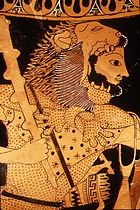Eurysthenes
| Eurysthenes | |
|---|---|
| Basileus (king) of Sparta | |

Heracles, founder of the Heraclids
|
|
| Reign | C. 1104 – 1066 BC |
| Predecessor | Aristodemus? |
| Successor | Agis I |
| Consort | Lathria |
| House | Heraclids |
| Father | Aristodemus |
| Mother | Argia |
In Greek mythology, Eurysthenes (Greek: Εὐρυσθένης, "widely ruling") was one of the Heracleidae, a great-great-great-grandson of Heracles, and a son of Aristodemus and Argia. His twin was Procles. Together they received the land of Lacedaemon after Cresphontes, Temenus and Aristodemus defeated Tisamenus, the last Achaean king of the Peloponnesus. Eurysthenes married Lathria, daughter of Thersander, King of Kleonoe, sister of his sister-in-law Anaxandra, and was the father of his successor, Agis I, founder of the Agiad dynasty of the Kings of Sparta.
The title of archēgetēs, "founding magistrate," was explicitly denied to Eurysthenes and Procles by the later Spartan government on the grounds that they were not founders of a state, but were maintained in their offices by parties of foreigners. Instead the honor was granted to their son and grandson, for which reason the two lines were called the Agiads and the Eurypontids.
The story of the double kingship of Sparta begins with the invasion of the Peloponnesus by the Dorians, and the Aetolian allies, under three Heraclid commanders, Temenus, Cresphontes and Aristodemus, the three sons of Aristomachus. Karl Otfried Müller collected and evaluated the various fragments of the story from classical authors. According to Müller, the state of Elis in Arcadia, allies of the Aetolians, provided a guide (Oxylus) for passage through Arcadia after crossing the Gulf of Corinth from Naupactus. Arcadia gave them a central point from which to attack anywhere else in the Peloponnesus. Their presence was contested by a united Peloponnesian Achaean army (except for Arcadia) under Tisamenus, an Atreid. The Achaeans lost. They were commanded to evacuate to Athens, but many did not; furthermore, much of the region remained unconquered.
...
Wikipedia
